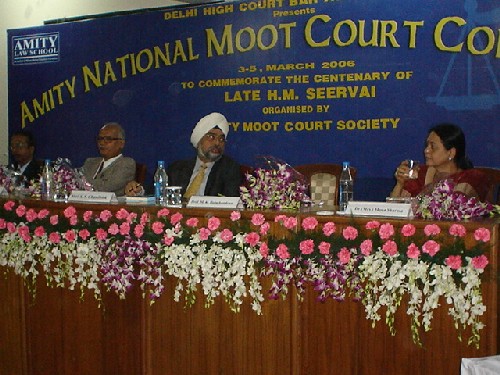03 Mar 2006-05 Mar 2006|Noida | Amity Law College, Yasho Bhawan, New Delhi
5th Amity National Moot Court Competition to commemorate the memory of Shri HM Seervai

The 5th Amity National Moot Court Competition was held on the premises of the Amity Law School, New Delhi. This year’s moot court was held to commemorate the centenary of Shri H M Seervai, eminent constitutional jurist. Shri Seervai’s magnum opus, ‘The Constitutional Law of India’ remains the only critical commentary on the Indian constitution till date. His work and contribution are likely to endure as long as the Constitution itself.
Amity National Moot Court Competition was inaugurated by Mr. Amarjit S. Chandhok, Senior Advocate, President, Delhi High Court Bar Association, Prof. M.K. Balachandran, Director, Amity Law School. About the qualities of a good lawyer, Mr K. S Chandok, gave primary importance to credibility, followed by scholarship and articulation ability. Addressing the concerns of the students about the profession becoming saturated, he said, “The ambit of law practice has expanded tenfold and specialisation has become the need of the hour.”
The competition saw a dazzling display of advocacy from students from 18 law colleges across the country.
The finals were judged by a distinguished bench of the Hon’ble Delhi High Court comprising of Justice Arjan Sikri, Justice S.K. Kaul, Justice S. Ravindra Bhat, Justice Gita Mittal and Justice Sanjiv Khanna. Close contest was witnessed between Government Law College, Mumbai and National Law School of India University, Bangalore, with Government Law College emerging as winners by a close margin. The judges uniformly complimented the participants on their legal acumen and commended the considerable amount of effort put in by all the teams in preparing their written submissions and arguments.
Explaining the importance of organizing moot courts, Prof. M.K. Balachandran, Director, Amity Law School said that The value of a moot court competition in a law student's education is only second to academics. The field of litigation is such that lawyers can practice in principally two areas, i.e., Litigation (Courtroom Argument) and Research Work including drafting. A law student who participates in a moot court is exposed to both these facets. The law student has to apply known legal principles to the given issue, and on occasion innovate to respond to a hitherto un-addressed issue. Thereafter he/she is made to draft Written Submissions for his case and then required to argue the case before a bench of judges, who are invariably either the doyens of the Bar or sitting High Court and Supreme Court Judges. Therefore, by preparing for one moot court a law student gets hands on practice in researching, drafting and arguing which is essentially he is required to do in future when he becomes an advocate